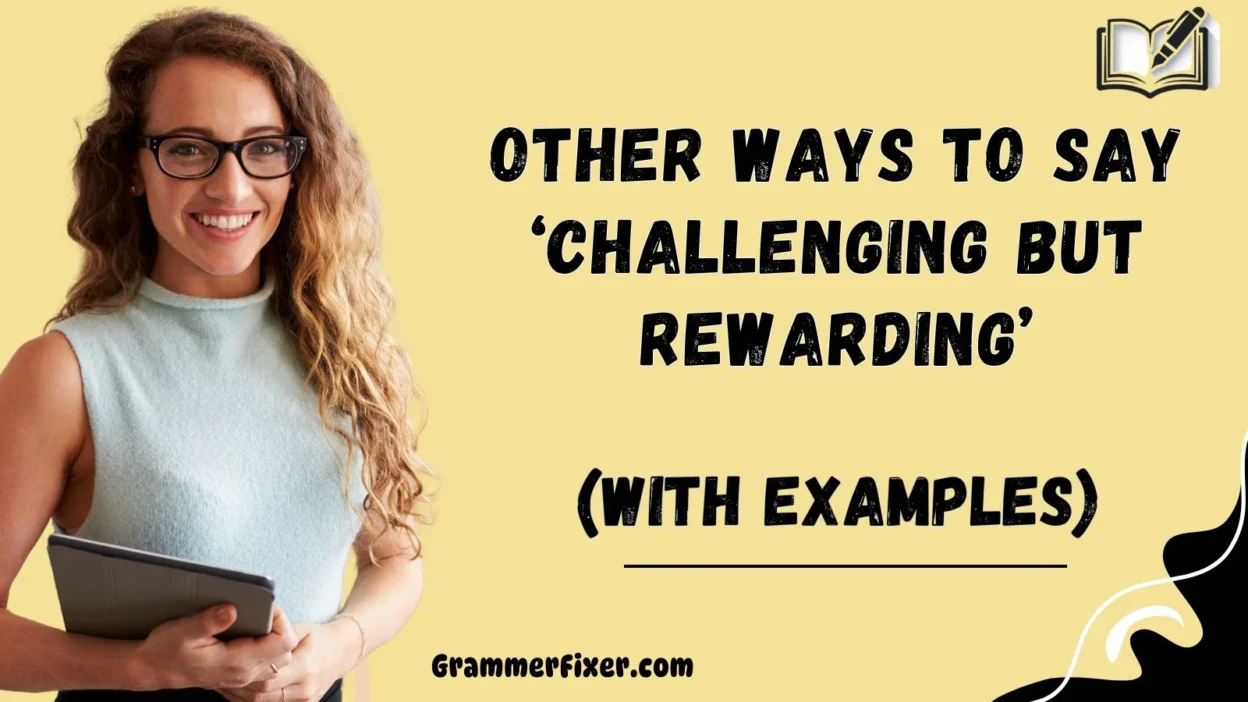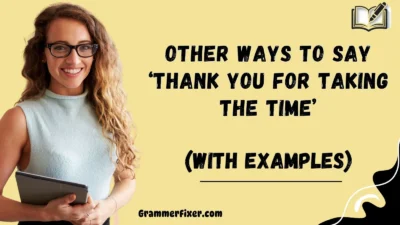Finding the right words to express growth, effort, and fulfillment can make all the difference in how your message is received. Whether you’re writing a performance review, reflecting on a project, or expressing your learning journey, saying something was “challenging but rewarding” conveys resilience and gratitude. However, using alternative phrases helps your message feel more personal, thoughtful, and professional.
Let’s explore 30 polished, warm, and professional ways to express this idea beautifully.
What Does “Challenging but Rewarding” Mean?
The phrase “challenging but rewarding” describes an experience that required significant effort, skill, or persistence, yet offered personal satisfaction, learning, or growth in return. It often reflects professional maturity, emotional intelligence, and a growth mindset, making it a popular expression in business communication, interviews, and reflective writing.
When to Use “Challenging but Rewarding”?
Use this phrase when you want to acknowledge difficulty while emphasizing the positive outcomes. It’s suitable for:
- Describing a project, task, or role that stretched your abilities.
- Reflecting on career growth or learning experiences.
- Expressing appreciation for teamwork under pressure.
- Sharing insights in reviews, feedback, or leadership communication.
Is It Professional/Polite to Say “Challenging but Rewarding”?
Yes — it’s both professional and polite. The phrase is widely accepted across corporate and academic contexts because it conveys humility, perseverance, and gratitude. However, overusing it can sound generic or rehearsed, so having varied expressions adds authenticity and richness to your communication.
Pros or Cons
Pros:
- Shows resilience and positivity.
- Expresses emotional intelligence.
- Communicates balance — not overly negative or overly self-praising.
Cons:
- Overused in interviews and essays.
- Can sound vague without context.
- May lack specificity if not followed by examples or results.
1. A Valuable Learning Experience
Meaning: An experience that provided knowledge, insight, or skills through effort.
Detailed Explanation: This phrase highlights the growth and educational value gained from the challenge rather than the struggle itself.
Scenario Example:
“Leading that project was a valuable learning experience that improved my problem-solving and leadership skills.”
Best Use: When discussing personal or professional development.
Worst Use: When the experience was negative with no takeaway.
Why It Works: It emphasizes learning over difficulty.
Tone: Reflective and positive.
2. An Enriching Journey
Meaning: A process that enhanced personal or professional growth.
Detailed Explanation: Suggests not just reward but depth, transformation, and enrichment through experience.
Scenario Example:
“Working with diverse teams across departments has been an enriching journey.”
Best Use: In long-term projects or mentorship reflections.
Worst Use: For short or routine tasks.
Why It Works: It feels warm, emotional, and sincere.
Tone: Uplifting and appreciative.
3. A Growth-Driven Experience
Meaning: An experience that fostered development through overcoming challenges.
Detailed Explanation: Highlights professional growth as the main outcome of facing obstacles.
Scenario Example:
“This assignment was a growth-driven experience that expanded my leadership skills.”
Best Use: In performance reviews or interviews.
Worst Use: When there was little or no personal growth.
Why It Works: It signals self-awareness and motivation.
Tone: Confident and mature.
4. A Rewarding Learning Curve
Meaning: A process that required learning through effort but led to success.
Detailed Explanation: Perfect for describing projects that required adapting or mastering new skills.
Scenario Example:
“Managing the transition to new software was a rewarding learning curve.”
Best Use: When discussing new tools, technologies, or roles.
Worst Use: When the task wasn’t skill-based.
Why It Works: Combines realism and optimism.
Tone: Balanced and encouraging.
5. A Transformative Experience
Meaning: Something that changed your perspective, approach, or mindset.
Detailed Explanation: Suggests deep personal or professional impact beyond ordinary reward.
Scenario Example:
“Collaborating with global teams was a transformative experience that reshaped my leadership approach.”
Best Use: When reflecting on major shifts in thinking or growth.
Worst Use: For routine or short-term challenges.
Why It Works: It communicates meaningful progress.
Tone: Reflective and powerful.
6. An Eye-Opening Experience
Meaning: An experience that revealed new insights or perspectives.
Detailed Explanation: Ideal for describing challenging experiences that expanded awareness.
Scenario Example:
“Handling client feedback was an eye-opening experience that improved my communication approach.”
Best Use: For personal insights or realization moments.
Worst Use: When no significant perspective changed.
Why It Works: It adds authenticity and humility.
Tone: Honest and thoughtful.
7. A Mentally Stimulating Task
Meaning: A task that required critical thinking and focus but felt intellectually satisfying.
Detailed Explanation: Suitable for describing analytical or creative work.
Scenario Example:
“Developing the new strategy was a mentally stimulating task that pushed me to think innovatively.”
Best Use: For strategic, problem-solving, or creative roles.
Worst Use: For purely manual or repetitive tasks.
Why It Works: Emphasizes intellectual engagement.
Tone: Intelligent and professional.
8. A Test of My Abilities
Meaning: Something that measured your capability, resilience, or adaptability.
Detailed Explanation: Communicates effort and accomplishment through challenge.
Scenario Example:
“Completing that project on a tight deadline was truly a test of my abilities.”
Best Use: When emphasizing overcoming pressure or limits.
Worst Use: If the task didn’t actually stretch your skills.
Why It Works: It shows strength and humility simultaneously.
Tone: Honest and determined.
9. An Opportunity for Growth
Meaning: A chance to develop new skills or perspectives through challenge.
Detailed Explanation: Focuses on positive framing — seeing challenge as an opportunity.
Scenario Example:
“Leading this initiative was an incredible opportunity for growth.”
Best Use: For interviews or feedback discussions.
Worst Use: When the experience was purely stressful without value.
Why It Works: Sounds optimistic and forward-thinking.
Tone: Grateful and empowering.
10. A Journey of Discovery
Meaning: A process of uncovering new ideas, skills, or strengths.
Detailed Explanation: Great for experiences that involve exploration or self-awareness.
Scenario Example:
“This project has been a journey of discovery, teaching me to lead with empathy.”
Best Use: When the experience led to personal or creative insight.
Worst Use: In rigid, technical contexts.
Why It Works: Adds depth and emotional connection.
Tone: Reflective and sincere.
11. A Professionally Fulfilling Experience
Meaning: An experience that contributed meaningfully to your career satisfaction and goals.
Detailed Explanation: Shows that the work wasn’t just difficult—it held professional significance and emotional fulfillment.
Scenario Example:
“Completing this project was a professionally fulfilling experience that aligned with my long-term goals.”
Best Use: In career reviews or portfolio summaries.
Worst Use: When the task didn’t connect to your career direction.
Why It Works: Demonstrates purpose-driven motivation.
Tone: Mature and appreciative.
12. An Uplifting Challenge
Meaning: A challenge that left you motivated and positive.
Detailed Explanation: Balances difficulty with enthusiasm—perfect for describing energizing struggles.
Scenario Example:
“Balancing multiple deadlines was an uplifting challenge that improved my time management.”
Best Use: For motivating team reflections or interviews.
Worst Use: For experiences that were emotionally draining.
Why It Works: Highlights resilience and optimism.
Tone: Encouraging and bright.
13. A Meaningful Accomplishment
Meaning: A difficult achievement that carries personal or emotional significance.
Detailed Explanation: Goes beyond success—it acknowledges depth, purpose, and pride in overcoming challenges.
Scenario Example:
“Seeing the final results felt like a meaningful accomplishment after months of collaboration.”
Best Use: For end-of-project summaries or leadership reflections.
Worst Use: For small or routine wins.
Why It Works: Shows gratitude and integrity.
Tone: Sincere and proud.
14. A Character-Building Experience
Meaning: A challenge that strengthened your personality, patience, or discipline.
Detailed Explanation: Suggests emotional maturity and self-growth through difficulty.
Scenario Example:
“Navigating unexpected changes was a character-building experience that improved my adaptability.”
Best Use: When emphasizing personal growth or resilience.
Worst Use: When the tone needs to remain strictly professional.
Why It Works: Expresses authentic growth and humility.
Tone: Honest and introspective.
15. A Skill-Enhancing Opportunity
Meaning: A chance to refine or expand your technical or soft skills.
Detailed Explanation: Perfect for career-oriented reflections that emphasize progress.
Scenario Example:
“This assignment was a skill-enhancing opportunity that deepened my expertise.”
Best Use: In resumes, interviews, and development reports.
Worst Use: When no new skills were developed.
Why It Works: Focuses on professional evolution.
Tone: Confident and developmental.
16. A Constructive Challenge
Meaning: A challenge that resulted in improvement or innovation.
Detailed Explanation: Shows that the experience wasn’t just tough—it was productive and goal-oriented.
Scenario Example:
“The client revisions were a constructive challenge that helped refine our final outcome.”
Best Use: When describing collaboration or problem-solving.
Worst Use: When the challenge was counterproductive.
Why It Works: Combines professionalism and positivity.
Tone: Objective yet appreciative.
17. A Rewarding Endeavor
Meaning: An effort that paid off through results, satisfaction, or growth.
Detailed Explanation: Broad and polished — perfect for formal communication or written reflections.
Scenario Example:
“Launching this product was a rewarding endeavor that taught us the value of persistence.”
Best Use: For project summaries or press releases.
Worst Use: In informal or casual settings.
Why It Works: Sounds elevated and professional.
Tone: Formal and positive.
18. A Stretching Experience
Meaning: A task that pushed your limits and expanded your capabilities.
Detailed Explanation: Ideal for communicating personal challenge without negativity.
Scenario Example:
“This leadership role was a stretching experience that honed my strategic thinking.”
Best Use: For performance reviews and self-assessments.
Worst Use: When the task was easy or repetitive.
Why It Works: Reflects ambition and perseverance.
Tone: Determined and respectful.
19. A Formative Experience
Meaning: An experience that helped shape your professional identity or values.
Detailed Explanation: Expresses deep growth and transformation.
Scenario Example:
“My early work in startups was a formative experience that built my entrepreneurial mindset.”
Best Use: When describing long-term career influence.
Worst Use: For short or insignificant events.
Why It Works: Shows depth, reflection, and maturity.
Tone: Thoughtful and reflective.
20. A Rewarding Milestone
Meaning: A significant achievement earned through sustained effort.
Detailed Explanation: Highlights success that came after perseverance and focus.
Scenario Example:
“Completing this certification was a rewarding milestone in my career.”
Best Use: For celebrating tangible achievements.
Worst Use: For minor or ongoing tasks.
Why It Works: Blends accomplishment with humility.
Tone: Proud and celebratory.
21. An Eye-Opening Journey
Meaning: A process that broadened your understanding over time.
Detailed Explanation: Merges discovery and duration—ideal for reflective communication.
Scenario Example:
“Working across departments has been an eye-opening journey of collaboration.”
Best Use: In leadership or mentorship reflections.
Worst Use: When the experience was brief or limited.
Why It Works: It’s rich, vivid, and human.
Tone: Warm and insightful.
22. A Professionally Enriching Task
Meaning: A work-related activity that offered meaningful learning and satisfaction.
Detailed Explanation: Balances effort and growth with a tone of gratitude.
Scenario Example:
“Developing this program was a professionally enriching task that challenged my creativity.”
Best Use: For formal reviews or presentations.
Worst Use: When the experience lacked engagement.
Why It Works: Sounds grateful yet confident.
Tone: Polished and uplifting.
23. A Learning-Intensive Process
Meaning: A process that demanded continuous learning and adaptation.
Detailed Explanation: Great for technical or skill-heavy projects.
Scenario Example:
“Implementing new systems was a learning-intensive process that strengthened my adaptability.”
Best Use: When emphasizing upskilling or evolution.
Worst Use: For simple or repetitive tasks.
Why It Works: Shows effort and intellect.
Tone: Analytical and respectful.
24. A Gratifying Accomplishment
Meaning: A satisfying outcome after considerable work.
Detailed Explanation: Perfect for expressing emotional and professional pride.
Scenario Example:
“Completing this project ahead of schedule was a gratifying accomplishment.”
Best Use: For reporting outcomes or recognition messages.
Worst Use: When the results were minor.
Why It Works: Highlights fulfillment and confidence.
Tone: Gracious and proud.
25. A Professionally Rewarding Challenge
Meaning: A challenge that directly contributed to your growth and satisfaction at work.
Detailed Explanation: A polished variation of the original phrase, suitable for formal communication.
Scenario Example:
“Transitioning to a new leadership position was a professionally rewarding challenge.”
Best Use: In reviews, promotions, or resumes.
Worst Use: For trivial or minor challenges.
Why It Works: Retains the original meaning with greater sophistication.
Tone: Confident and formal.
26. An Educational Experience
Meaning: Something that taught you valuable lessons through effort or adversity.
Detailed Explanation: Highlights learning and insight, making it a humble way to describe growth.
Scenario Example:
“This collaboration was an educational experience that improved my negotiation skills.”
Best Use: When discussing teamwork or cross-functional roles.
Worst Use: When the experience lacked lessons or growth.
Why It Works: Feels humble and grounded.
Tone: Respectful and thoughtful.
27. A Resilience-Building Experience
Meaning: A situation that strengthened your endurance and persistence.
Detailed Explanation: Communicates emotional intelligence and perseverance.
Scenario Example:
“Adapting to shifting priorities was a resilience-building experience.”
Best Use: For team challenges or leadership development.
Worst Use: When stress outweighed learning.
Why It Works: Reflects grit with grace.
Tone: Empowering and strong.
28. A Fulfillment-Oriented Challenge
Meaning: A demanding experience that ultimately led to deep satisfaction.
Detailed Explanation: Balances struggle and achievement while emphasizing purpose.
Scenario Example:
“Coordinating the event was a fulfillment-oriented challenge that tested my organization skills.”
Best Use: When discussing personal motivation or achievement.
Worst Use: When the outcome was unsatisfactory.
Why It Works: Conveys commitment and joy in effort.
Tone: Warm and purposeful.
29. A Motivating Hurdle
Meaning: An obstacle that inspired growth and action.
Detailed Explanation: A creative and motivational way to describe overcoming adversity.
Scenario Example:
“Budget limitations became a motivating hurdle that sparked innovation.”
Best Use: For problem-solving or leadership reflections.
Worst Use: When the difficulty discouraged progress.
Why It Works: Turns struggle into empowerment.
Tone: Energetic and positive.
30. A Professionally Transformative Challenge
Meaning: A demanding experience that reshaped your professional approach or mindset.
Detailed Explanation: The most complete and impactful synonym — ideal for major professional milestones.
Scenario Example:
“Leading this organization through change was a professionally transformative challenge.”
Best Use: For career-defining moments or leadership reflections.
Worst Use: For minor or routine tasks.
Why It Works: Feels mature, inspiring, and confident.
Tone: Profound and inspiring.
Conclusion
Finding the right alternative to “challenging but rewarding” helps you communicate authenticity, emotional depth, and professionalism. Each phrase above captures a different nuance—from learning and growth to fulfillment and transformation. By choosing the right tone and expression, you ensure your message feels sincere, thoughtful, and uniquely you.
Because ultimately, the way we describe our challenges tells the world not just what we’ve done, but how we’ve grown. 🌱



